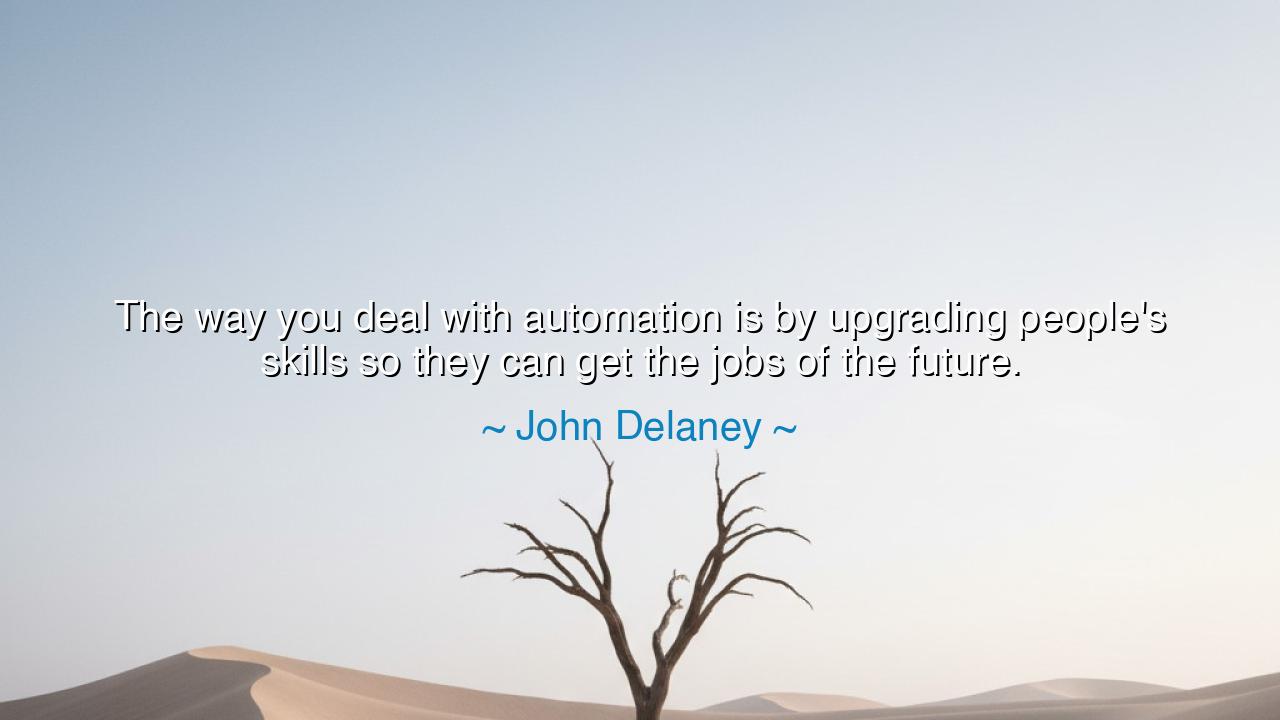
The way you deal with automation is by upgrading people's skills
The way you deal with automation is by upgrading people's skills so they can get the jobs of the future.






The statesman John Delaney, speaking to an age trembling between progress and uncertainty, once declared: “The way you deal with automation is by upgrading people’s skills so they can get the jobs of the future.” These words carry the weight of both reason and compassion, for they acknowledge the storm that modern humanity faces — a storm of machines, of changing work, of shifting purpose — yet offer a path not of fear, but of courage and renewal. Delaney’s insight is not simply a policy of economics, but a philosophy of survival, even of rebirth: that mankind must not cower before the tools it has created, but grow in wisdom to wield them.
In the manner of the ancients, let us say that every age has its trials, and in each, the wise must choose between fear and adaptation. When fire was first tamed, some saw destruction; others saw warmth and progress. When the wheel turned, some feared the loss of tradition; others saw the beginning of civilization. Now, in our age of automation, we stand again at the crossroads. Machines and algorithms, born of human ingenuity, now labor beside us — sometimes faster, sometimes stronger. Many tremble, fearing the end of human work. But Delaney’s words remind us: the solution is not retreat, but transformation. For when the tools of humanity evolve, humanity itself must evolve to meet them.
The origin of this wisdom lies in both history and foresight. John Delaney, a businessman turned public servant, spoke these words as part of his vision for an America prepared for the digital era. He saw that automation — the rise of artificial intelligence, robotics, and data systems — would not destroy work, but change its nature. To survive such a transformation, a people must not cling to the past but invest in their capacity to learn anew. It is an echo of an ancient truth: that knowledge is the only shield against obsolescence, and education the only ladder to the future.
Consider the tale of the Industrial Revolution, when machines first began to replace manual labor on a vast scale. The weavers of England, the Luddites, rose in fury, smashing the machines they believed were stealing their livelihood. Yet history showed that while old jobs perished, new industries — railways, manufacturing, engineering — emerged, demanding new skills. Those who learned to adapt found prosperity; those who did not were left behind. This is the pattern of all human progress: tools change, but human purpose endures. The secret, as Delaney reminds us, is to upgrade the soul alongside the tool — to let learning be the constant companion of invention.
And so, Delaney’s call to “upgrade people’s skills” is not only a strategy for employment but a moral duty for leaders and citizens alike. It is the call to dignify labor in all its forms — to ensure that when machines take over the routine, humans rise into the creative, the analytical, the compassionate. For machines can calculate, but they cannot dream. They can execute, but they cannot envision. When a society invests in education, in vocational training, in lifelong learning, it does not merely prepare its workforce — it honors its humanity. It declares that progress shall serve people, not the other way around.
O children of the digital dawn, hear this wisdom: fear not the machine, but fear ignorance. The future belongs to those who learn faster than it changes. Make knowledge your armor, curiosity your weapon, and adaptability your creed. Let no man or woman be left behind, for the strength of a nation lies not in its machines but in the minds of its people. In every age of invention, the true wealth has not been gold, nor coal, nor silicon, but the human spirit’s unending capacity to learn and to build anew.
And so, the lesson of Delaney’s words shines clear: the future of work is not a battlefield between man and machine, but a partnership. Let governments educate, let teachers inspire, let every worker embrace the noble art of learning. For the world will always change — that is its nature — but the wise will always rise to meet it. Therefore, do not mourn the passing of old labors; celebrate the dawn of new ones. The hands that once built with hammer and nail must now build with thought and innovation. In this way, as Delaney prophesied, we shall not be crushed beneath the wheels of progress, but steer them — boldly, wisely, and together — toward a future bright with blessing.






AAdministratorAdministrator
Welcome, honored guests. Please leave a comment, we will respond soon